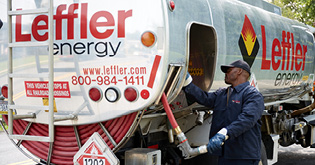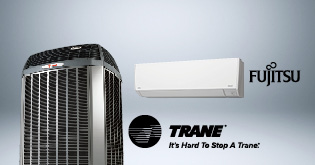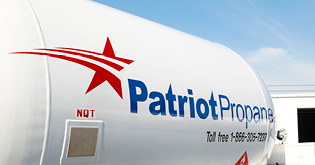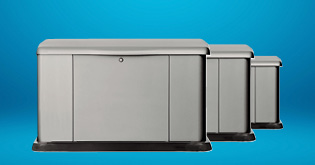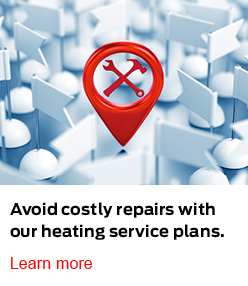
Home heating resources and FAQs.
Are you looking for information about your home heating system? We have curated our best resources focused around home heating services and appliances, such as furnaces and hot water heaters, in order to keep you informed about your home. Doing something research and identifying any issues yourself can save you and your family a ton of time and money because you may ultimately not need to help of a professional. Therefore, we hope you find our articles to be a good place to start. We have covered a number of home heating topics, from very basic how-to guides, to detailed articles about the inner workings of your system that may be used to diagnose more severe issues, should they arise.
Is it time to replace your oil or natural gas furnace?
Your furnace is one of the most important investments, and pieces of equipment, in your home. It pays to keep track of just how efficiently and effectively your warm air oil or natural gas furnace is running. It's crucial to know when to replace it before it costs you more in repairs than a new purchase or if it becomes unsafe. A comfortable and healthy home environment requires an energy-efficient and safe heating system. You need one that heats the home without using large amounts of energy and that doesn't endanger indoor air quality.
How do you know when it's time to consider getting a new furnace?
If your oil or natural gas furnace is 12 years old or younger and has been properly maintained, you shouldn't need to worry about replacing your unit just yet.* Instead, you should spend some time and money to improve the energy efficiency in other areas of your home and ensure that you perform regular, proper maintenance of your furnace to keep it lasting longer.
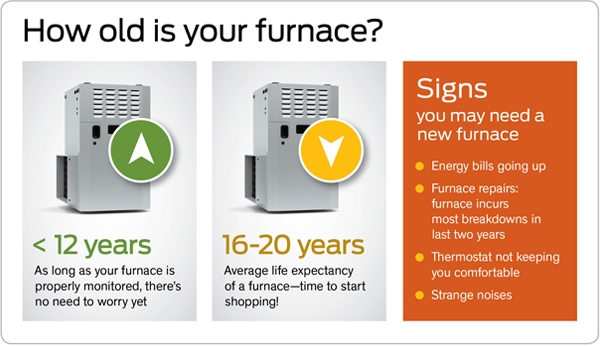
"Warning Signs" of a failing furnace.
It is important to be aware of some warning signs from your oil or natural gas furnace that indicate it may need replacing. A cold, snowy winter night with a failing or faltering furnace is not the time to assess your heating system. It pays to be prepared and information is the key to making a wise decision. Below are some "warning signs" that you should be looking for. Of course, not all of them may apply to your particular equipment but you may use them as a general rule of thumb to gauge just how much life you have left in your furnace:*
1. How old is your furnace?
A good place to start is to compare your oil or natural gas furnace age to the national average. The average life expectancy of furnaces in homes today is between 16 and 20 years.* If your furnace is close to this age or older, you should begin shopping. Shopping for a replacement furnace in an emergency does not allow time for you to make your best decision. Most people prefer to replace their furnace as a planned home improvement rather than a panic replacement when their furnace is faltering or has already failed. The typical lifespan of a warm air furnace will vary based on its operating environment, that's why it's important to have the system serviced regularly by a qualified technician. They will be able to properly assess the condition of the furnace and make any recommendations.
2. Are your energy bills going up?
Rising energy costs are not the only reason for high bills. Furnaces often lose their efficiency as they age, especially if they have not been properly maintained. As a result, your oil or natural gas furnace may run longer to provide the same amount of heat. This will cause your energy bills to go up. And, all of the money you pay your energy utility companies every month could be used to help you pay for a new, much more energy-efficient, and energy-saving furnace.
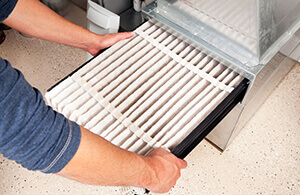 3. Have you had any furnace repairs in the last 2 years?
3. Have you had any furnace repairs in the last 2 years?
Furnaces are like cars. As they age, you can replace one part and only need another part replaced or repaired next year. It doesn't take long to spend $500 just to keep an old oil or natural gas furnace running. Furnaces incur the most breakdowns in the last 2 years of their lives. Another repair sign is whether you had to wait to get parts replaced. As a furnace ages, it gets harder to source replacement parts. Waiting for that can be really cold on a below zero night.
4. Does your thermostat keep you comfortable?
Do you feel that some rooms are too cold while others are too hot? Or are you always trying to adjust your thermostat to make your home more comfortable? This is a sign that your furnace lacks the ability to properly distribute the air to keep you comfortable in your home.
5. If you have a natural gas furnace, is your burner flame yellow instead of blue?
All heating systems run the risk of carbon monoxide emissions. However, owners of older chimney-vented oil-fired furnaces don't necessarily face the same safety concerns posed by natural gas and propane, since oil-fired boilers and forced-air furnaces tend to be much less likely to produce carbon monoxide. If you have a natural gas or propane furnace, a yellow or flickering flame may be a sign that poisonous carbon monoxide could be created by your furnace. Other possible signs of carbon monoxide are:
- Streaks of soot around the furnace
- Absence of an upward draft in your chimney
- Excess moisture found on windows, walls, or other cold surfaces
- Excessive rusting on flue pipes, other pipe connections, or appliance jacks
- Small amounts of water leaking from the base of the chimney, vent, or flue pipe
- Rust on the portion of the vent pipe visible from the outside
- Family ailments such as headaches, nausea, disorientation, and flu-like symptoms
Always be mindful and monitor your furnace for any of the signs noted above and always make sure to have carbon monoxide detectors on every floor of your home, particularly close to your furnace room.
6. Is your furnace making strange noises?
Old furnaces often start to make some strange noises as they get toward the end of their life. Have you heard any banging, popping, rattling, or squealing noises coming from your furnace? Another noise is when you hear the furnace blower running excessively. Does your blower turn on and off frequently or does it blow cold air sometimes? If so, this is a sign that your furnace may need to be replaced.
7. Is your house dry or dusty?
Old furnaces often lack the ability to moisturize and clean the air in your home. Your house air may feel stuffy or stale. Does anyone in your family suffer from allergies to airborne dust, mold, pollen, viruses, or dander? Or does anyone suffer from dry nose, dry throat, or dry skin? Other signs may be frequent dust accumulation, static shocks drooping plants, and furniture cracking. These may seem like trivial observations but all suggest that your old furnace is not capable of providing you with the comfort you and your family may want and need. Poor indoor air quality may also not be associated with an old furnace, poor ventilation and other reasons can cause it, too. Please contact us to have one of our service technicians assess your situation as we may have other air quality services and solutions for you.
If any of these "warning signs" apply to you, it might be time to consider the purchase of a new furnace.
Think you need a new furnace? Don't despair. It may end up helping you save!
It's a fact that a new furnace for your home is one of the more substantial costs involved in home ownership. But, it should also be seen as a long-term investment. All of the latest furnaces are much more energy-efficient than those installed even 20 years ago. So, while it may seem like a short-term larger expense, a new, more energy-efficient home heating system will more than likely save you money in the longer term by lowering your annual energy costs.
We've got the furnaces you need to help you save.
By installing a new home furnace or heating system from Leffler Energy you'll improve your home's value, enjoy fast installation and professional training on your new heating system and qualified customers can take advantage of some great financing options.
And, we've got all of your furnace maintenance and repair needs covered.
Whether you need to maintain the furnace you have or need to protect the investment in a new furnace purchase, the right service plan makes all the difference. Our multiple service contract and protection plan options provide the tune-up, repair, and maintenance services required to protect your furnace investment. All are backed by 24/7 service and support - whatever the weather.
Think you need a new furnace? Have one of our technicians assess your current furnace.
Call 800.984.1411 now.
Make sure your current furnace is operating efficiently by scheduling a tune-up.
- Start saving today by installing a new, energy-efficient home heating system
- Take advantage of special offers on heating systems
Call 800.984.1411 for more information.
*Source: homeenergycenter.com


